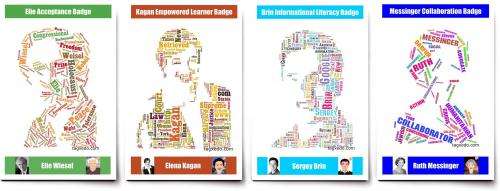Use of 'digital badges' in schools would motivate students, research shows

The blend of digital technology and traditional merit badges, such as those earned by Boy and Girl Scouts, would provide an opportunity to both motivate and measure learning, according to new research by University at Buffalo education professor Sam Abramovich.
Use of the modern digital badge—an online representation of mastery of knowledge or skills—can be a valuable supplement to the more established educational assessment tools such as the SAT and classroom grades, says Abramovich, an assistant professor in both the departments of Learning and Instruction, and Information and Library Studies in the Graduate School of Education.
"What badges can do is provide an avenue to create the next generation of assessments," he says.
Abramovich and colleagues investigate the use of school-based badges in a new study forthcoming in the International Journal of Learning and Media, and in a previous study published in Educational Technology Research and Development.
In his investigation of several badge systems, Abramovich finds three essential ingredients for successful educational badges: They have to present some enjoyment for the learner, they must recognize work that extends beyond a student's typical academic ability and the student has to value what that badge represents.
"If the student doesn't care about a learning objective," he says, "why would they care about the badge? But if we can provide a badge for something they've mastered that is important to them, then we can use that as a foundation for their future learning."
Badges can be important supplements to more established educational assessment devices, Abramovich says. They add another dimension to the learning process that traditional testing tools do not address.
Examples of some downloadable digital badges are available here: http://www.buffalo.edu/news/releases/2015/02/011.html.
He says many learning opportunities that use a test, like a final exam, to measure learning are "not authentic."
"When was the last time you had to take a traditional test for your job?" he asks. "And even if you pass a test at the end of a course, it's hard to know what that means in regards to your learning. It's what you do with what you learned and how it continues to grow that matters. We're all lifelong learners."
Badges can change the focus on test-taking, says Abramovich, providing a tool for motivation and assessment, and a way to provide credentials for learning.
"What badges do is target the learning that is traditionally unrecognized," he says.
Badges, of course, are not a new concept. A Girl Scout or Boy Scout merit badge is a good example, and video games often offer digital badges for a level of achievement.
"Badges refer to achievement, when you are acknowledged for achieving a goal," Abramovich says. "They could be awarded for winning a game, but not always. More importantly, they provide feedback that tells you what you accomplished, even if it isn't explicitly about winning or getting a grade. And you can display a badge in an online profile or on Facebook, so your social network is notified."
One of the threefold benefits of badges includes motivation, Abramovich's research points out. Video games already take advantage of this by acknowledging that the player achieved a certain goal. A badge tells the player he accomplished something. It's not necessarily for winning the game, but rather provides an "assessment" of the player's progress, Abramovich says.
Badges also designate credentials, a representation of ability.
Because digital badges can be displayed online, "someone else can look at the badge an individual has earned and say, 'Oh, I can see that this person knows how to build robots because they earned a badge for it," Abramovich says. "In professional settings, the value is that employers can see what an individual has learned and who verified that they possess a particular skill ... was the issuer of the badge."
The assessment part is key, whether it is in a school setting or another environment, Abramovich explains.
"So much important learning occurs in so many different settings. There are all kinds of skills learned in a classroom, or informally such as in a museum, or in reading websites at night," he says. "And while that learning is often so valuable to success in life, it's also often ignored by formal educational processes. The power of the digital badge is that it provides assessment for what normally goes ignored."
Abramovich stresses he is not advocating an end to standard educational tools such as grades and the SATs.
"I'm an educational researcher first and a 'badge advocate' second," he says. "I want to know if and how badges can work in a variety of educational settings. I suspect they can, but there are reasons why traditional assessment has served us well for so many years."
Provided by University at Buffalo

















